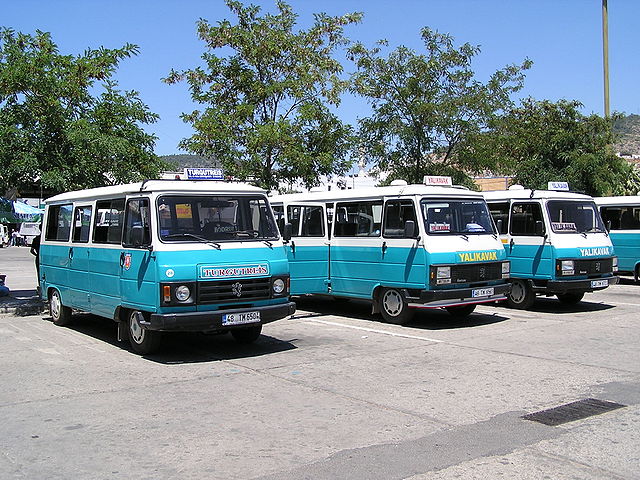Karsan
Turkish commercial vehicles manufacturer based in Bursa From Wikipedia, the free encyclopedia
Karsan (Turkish: Karsan Otomotiv Sanayii ve Ticaret A.Ş. English: Karsan Automotive Industry and Trade Joint-Stock Company) is a Turkish commercial vehicles manufacturer, based in Akçalar, Nilüfer, Bursa Province. "Karsan" is an acronym for "Karoseri Sanayii" (English: Carrosserie/Bodyworks Industry).
This article needs additional citations for verification. (February 2015) |
 | |
| Company type | Anonim Şirket |
|---|---|
| BİST: KARSN | |
| Industry | Manufacturing |
| Founded | 1966 |
| Headquarters | Akçalar, Bursa, |
Area served | Worldwide |
Key people | İnan Kıraç (Chairman) Muzaffer Arpacıoğlu (Deputy General Manager of Business Affairs) Okan Baş (CEO) |
| Products | Automobiles, commercial vehicles, Electric bus |
| Revenue | $480 million USD (2013) |
Number of employees | 1,083 |
| Parent | Kıraça Group |
| Website | karsan |
History
Summarize
Perspective
Karsan was founded in 1966 in Bursa, Turkey, to produce light commercial vehicles. Koç Group assumed management control of the company between 1979-1998. Later on, Kıraça Group took over the company in 1998 by acquiring the majority of the shares under the leadership of İnan Kıraç.[1]
Karsan, owned by 100% Turkish capital, produces and sells Peugeot light commercial vehicles under a licensing agreement with the French manufacturer, as well as the Fiat Ducato and its rebadged version the Peugeot Boxer.[2] In addition to these, Karsan produces and sells specialised vehicles such as ambulances, taxis, patrol vehicles and 4x4s.
Karsan also has cooperations with Hyundai for light trucks manufacture, with Renault Trucks for long-distance trailer-trucks and with BredaMenarinibus for bus manufacture.[2]
Karsan's V-1 was one of three finalists, alongside the Ford Transit Connect and Nissan NV200, for New York City's Taxi of Tomorrow. The Nissan NV200 was announced the winning model on 3 May 2011.[3][4]
At the end of 2010, the J9 Premier minibus was replaced with the Karsan J10, available in three body versions-with 14, 17 or 20 seats, and powered by a Euro 4 common rail 2,3 liter diesel engine of Iveco origin.[5] At the end of 2013, the J10 minibus has been replaced by the Karsan Jest.[6]
In December 2018 the company acquired the 70% of Industria Italiana Autobus through a capital increase. The following month, after a meeting with Ministry of Economic Development, the participation in IIA fell to 20%.[7]
Current models


- Peugeot Boxer (2001–unknown)
- Fiat Ducato (2001–present)
- Hyundai Truck (2007–present)
- BredaMenarinibus Vivacity (2010–present)
- BredaMenarinibus Avancity (2010–present)
- Menarinibus CITYMOOD (2014–present)
- Karsan V-1 (prototype)
- Karsan Jest (2013–present)
- Karsan e-Jest (2018–present)
- Karsan Atak (2014–present)
- Karsan e-Atak (2021–present)
- Karsan Star (2014–present)
- Hyundai H350 (2015–present)
- Renault Megane IV Sedan (2022-present)[8]
- Karsan e-ATA (20xx-present)
- Karsan e-ATA Hydrogen (2022–present)
Former models



- Peugeot J9 (1981–2006)
- Peugeot Partner (1997–2013)[9]
- Karsan J9 Premier (2006–2010)
- Citroën Berlingo (2008–2013)[9]
- Renault Premium (2008–2013)
- Renault Kerax (2009–2013)
- Karsan J10 (2010–2015)
Karsan worldwide
- Karsan Jestronic in Switzerland
- Karsan e-Jest in Vilnius, Lithuania
- Karsan Star in France
- Karsan e-Jest in Poland
- Karsan Atak in Hungary
- Karsan Jest in Romania
- Karsan Jest in Austria
- Karsan in Istanbul, Turkiye
See also
References
External links
Wikiwand - on
Seamless Wikipedia browsing. On steroids.







